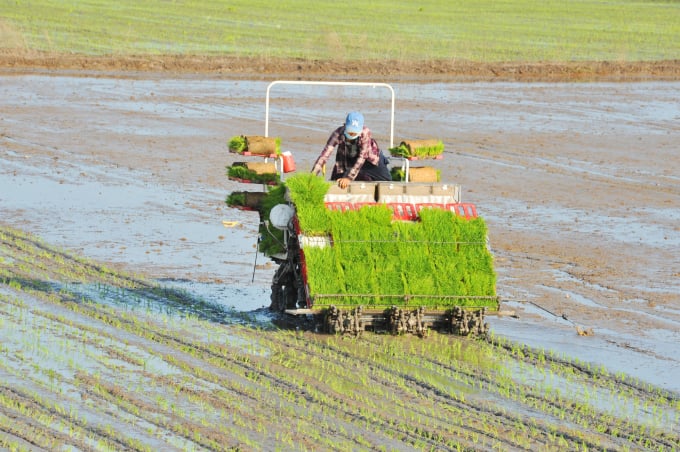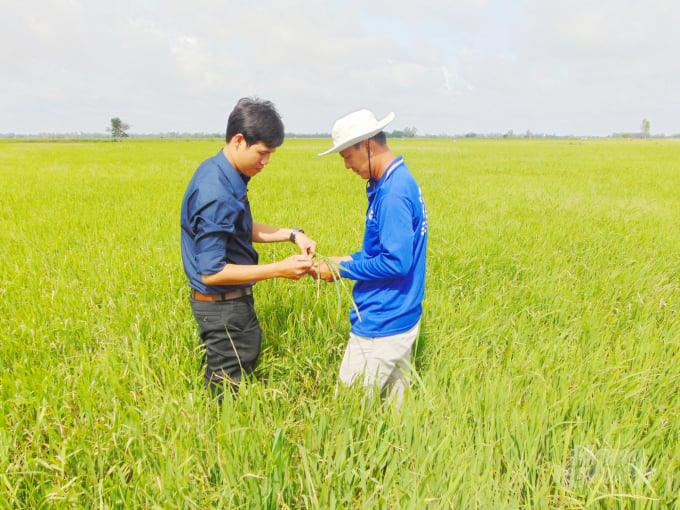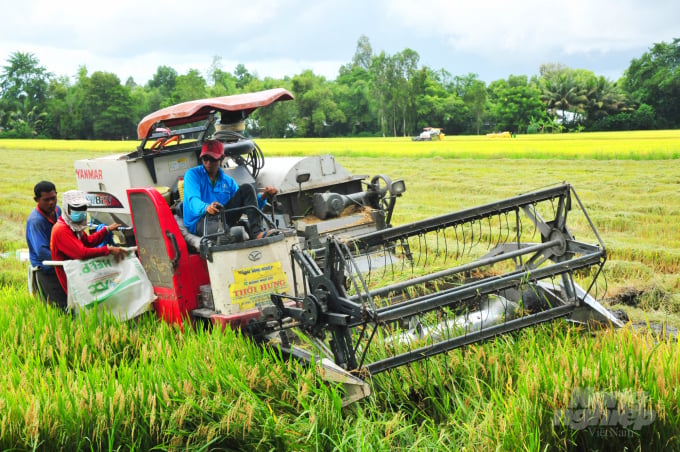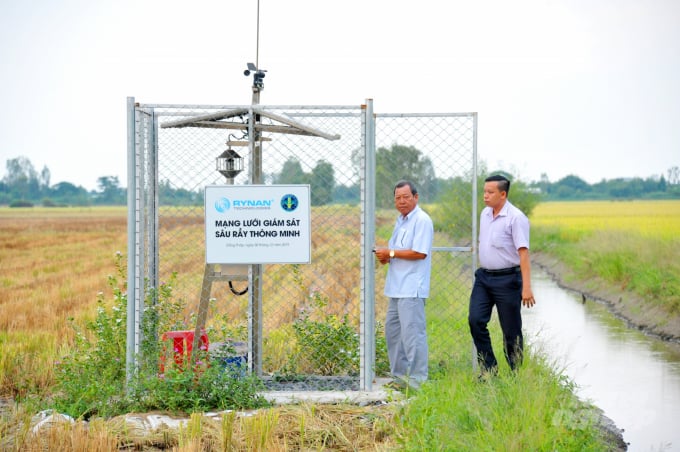November 20, 2025 | 12:06 GMT +7
November 20, 2025 | 12:06 GMT +7
Hotline: 0913.378.918
November 20, 2025 | 12:06 GMT +7
Hotline: 0913.378.918

Along with mechanization in agroproduction, advanced rice farming procedures from the VnSAT Project have helped Dong Thap farmers effectively reduce costs. Photo: Le Hoang Vu.
In the past two years, the price of agricultural materials has been in constant increase, especially the price of fertilizers and pesticides, causing many difficulties for farmers.
Despite these challenges, many farmers in Dong Thap have boldly persevered and popularized the application of cost-reducing solutions in rice production such as the Vietnam Sustainable Agricultural Transformation (VnSAT) Project, applying advanced and water-saving rice production model. Dong Thap province fully utilizes 4.0 technology and VnSAT techniques such as "3 decrease 3 increase" (3T3G), "1 must 5 decrease" (1P5G) as well as linking production and consumption with enterprises.
Owning 5 ha of rice paddies producing 3 crops/year, the family of Mr. Lam Hung Phong (Phu Tho commune, Tam Nong district, Dong Thap), has started to implement costs reduction measures, following the guidance of the VnSAT Project and discarding the conventional production methods since the 2019 - 2020 winter-spring crop. Mr. Phong also participates in making connections with enterprises in terms of rice seed production, so recent rice crops of the family have a lot of production costs saved. Thanks to the seed production contracts, the output is secured, and the selling price is always VND 500 - 1,000/kg higher than the market price, resulting in great profits.

Dong Thap considers the VnSAT Project leverage for technical advances in rice cultivation. Photo: Van Vu.
Having witnessed the effectiveness of VnSAT, many farmers outside the project area are also become more aware of problems concerning production costs and willingly register to participate in farm business models.

Farm business models applying mechanization and advanced farming solutions in sync. Photo: Le Hoang Vu.
Elder farmer Nguyen Hong Phuoc in Hamlet 4, My Dong commune, Thap Muoi district, has been paying great attention to utilizing new technical measures to reduce rice production costs in recent years. All of his 7 ha of crop apply mechanization from all stages: tillage, sowing, spraying pesticide, fertilizer spreading as well as the 3T3G and 1P5G techniques studied from the VnSAT Project. The production costs have been reduced from 25 - 30% compared to the previous old farming methods.
And according to Mr. Nguyen Van Hung, Director of Thang Loi Cooperative in Thap Muoi district, up to now the cooperative has had over 90% of rice area switching from manual sowing to machine sowing/transplanting, helping farmers save 60 kg of seed rice/ha/crop and 15 kg of fertilizer/ha. All stages including tillage, irrigation and harvesting are 100% mechanized.
“Modern rice production techniques help the cooperative save VND 250-400/kg of commercial rice. The difference in profit is VND 3 - 3.5 million/ha compared to the old production method. Production costs have evidently decreased, the consumption market is guaranteed, the physical and mental life of Thang Loi Cooperative’s members and affiliated households is increasingly improved. At present 100% of the members and affiliated households have escaped poverty. Dozens of households even succeed in making a fortune out of their rice fields," Mr. Hung said.

Rice farmers in Dong Thap no longer worry about the attack of pests and planthoppers because their fields have been equipped with intelligent pest monitoring stations. Photo: Van Vu.
Mr. Bui Van Son, Head of Thap Muoi Office of Agriculture and Rural Development, said, “The application of 3T3G and 1P5G has long been the key to helping farmers in the district facing issues concerning production cost. The productivity remains stable and profits are increased day by day.”
The district's agricultural sector harbors the intention to further recommend and guide farmers so that they can effectively study more scientific and technical advances for extensive deployment. Other programs from the VnSAT Project also help farmers raise their rice production proficiency to a new level.
The local agriculture sector also creates favorable conditions to aid farmers, cooperatives, and cooperative groups in the process of developing senses of collective business, production linkages and application of mechanization in the fields. The ultimate goal is to increase productivity, product quality, and reduce production costs.
Translated by Samuel Pham

(VAN) This is the study conducted by IRRI and Can Tho University on the rice straw value chain in Mekong Delta showing an economic potential of more than 6.6 trillion VND/year.

(VAN) By participating in cooperative economics, many farmers in Tay Ninh have overcome hardship, mastered clean dragon fruit cultivation techniques.

(VAN) The crossbreeding program in the former Binh Dinh province (now part of Gia Lai) has shown signs of decline, and urgent measures are needed to revive it and sustain past achievements.

(VAN) The agricultural sector agreed on a roadmap to pilot the MRV protocol and expand low-emission rice production from the 2025-2026 winter-spring crop.

(VAN) Agricultural extension officers in Quang Ninh do more than transmit knowledge; they have become a steadfast support system for farmers on the path to sustainable agricultural development.

(VAN) The development of a high-quality beef cattle herd has brought major benefits to livestock farmers, creating jobs and enabling better use of agricultural by-products.

(VAN) In the eastern region of Gia Lai, crossbred cattle now account for 93%, forming a high-quality beef herd and establishing a recognized brand, the result of 35 years of persistent effort.